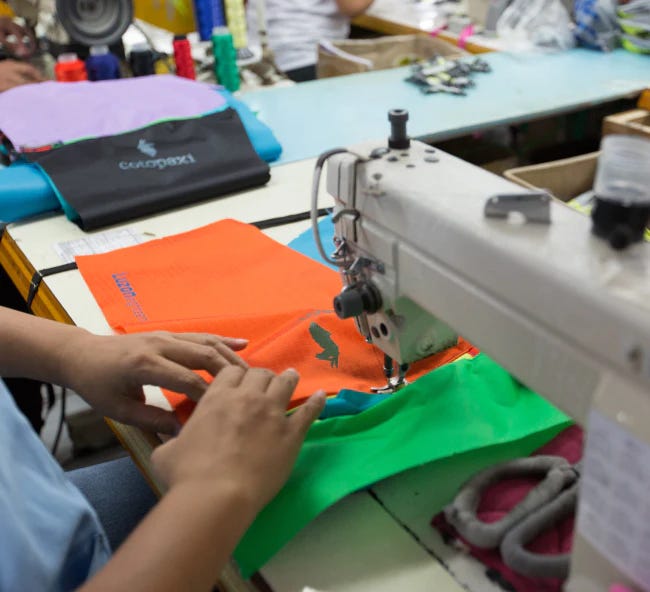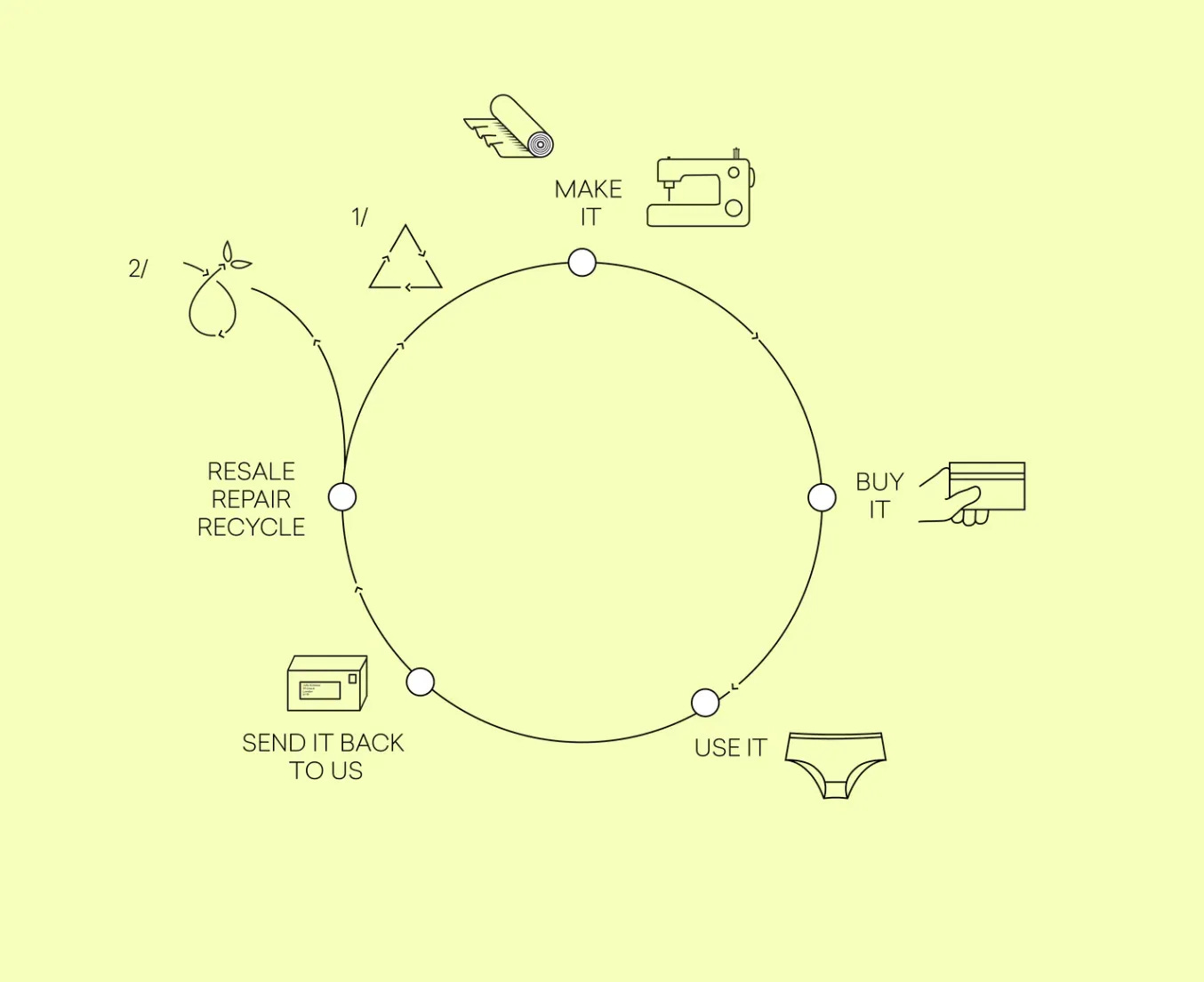🌱 'Gear for Good': Reskinned and Cotopaxi are investing in a fairer fashion supply chain.
Featuring Cotopaxi, Finisterre, Sweaty Betty, TOTM and more...
Happy Monday!
This week we cover:
Reskinned: Revitalising your brand’s old garments.
Inside Cotopaxi’s ‘Gear for Good’ Philosophy
In case you missed it: 🌱 ONE Essentials are designing for circularity - here are 10 resources to help your brand do the same.
> Good News Last Week
🎯 The Jolly Hog became the first UK meat company to become a certified B Corp, with a score of 80.7. They’re focusing on meat from farms that meet high animal welfare standards, as well as Jolly Good Deeds - which aims to reduce food poverty and commits to fully recyclable packaging.
🎯 Ethical, sustainable period care brand TOTM, announced their B Corp certification with a score of 103.7. With biodegradable cardboard applicators, reusable menstrual cups and tampon applicators, TOTM have saved over 2 million plastic applicators from entering both ocean and landfill.
🎯 Nix & Kix announced they a certified B Corp, with a score of 90.6. Using Giki Earth to track and reduce their carbon footprint and suppliers signed up with EcoVadis, SEDEX and CDP and aligned with their values.
🎯 DASH Water announced that they are officially carbon neutral. They worked with Ecologi, Carbon Cloud, PlanetMark and Respira to measure and offset the lifecycle of their drinks, from cradle to grave and cut 5 tonnes of CO2.
⭐️ Gousto launched their Cutting Carbon Range in partnership with Foodsteps. Offering customers the choice to choose recipes that have been verified as low carbon. Choosing a low carbon meal once a week for a year is calculated to save 74kg CO2e (or driving 188 miles).
⭐️ Cogo have launched The Cogo Business Carbon Manager in partnership with Xero, to measure both operational and upstream supply chains emissions. Data is available based on spend within Xero accounting software, to enable easier climate-positive decisions with results that benefit bottom line profitability.
⭐️ A group of retailers including Decathlon and Zalando have announced a £1 million investment in collaboration with Groupe Eram and recycling organisation Revalorem, to launch a shoe recycling initiative ‘Reshoes,’ with French technology centre, Cetia. 1,000 shoes and soles will be processed for recycling each day during the industrial pilot taking place over the next 6 months.
⭐️ Premier Foods launched an online tool, Fresh take on Food Waste, with recipes based on food items most commonly found at the back of people’s fridges, with the option to select an ingredient that users want to use up. Part of Premier Food’s Enriching Life Plan to support consumers to lead a sustainable and healthier lifestyles, reduce food waste and save cost.
⭐️ Ganni announces the pilot of their new sustainable fabrics using banana waste, from the waste stalk of the banana tree. Part of their Fabrics of the Future initiative, the fibre could offer an alternative to synthetic fibres and eliminate carbon emissions generated by banana farms.
> Click on each link to read more.
> Quick Take
Reskinned: Revitalising your brand’s old garments.
Advocates for the ‘preloved revolution’, Reskinned are quickly becoming the all-in-one platform for the reselling, repurposing and recycling of your brand’s garments - closing the loop whilst giving your customers credits too.
Relied on by leading FMCG brands like Finisterre, Sweaty Betty, Skins, Joules and more - here’s why….
Re-Sale
30% of all garments passed through Reskinned end up being re-sold
All clothes passed to Reskinned go through a grading process where quality and condition is checked. Items are then ‘ozone sanitised’, which is kinder to the environment than regular washing as it requires no water. Clothes are then sold back to the public via the Reskinned website for 40-50% their original price, and any item that is predicted to not sell well in UK markets is then resold to long term partners elsewhere in Europe and Africa - with the reassurance that they wont end up in landfill or dumped.
Re-Purpose
40% of all garments passed through Reskinned end up being re-purposed
Reskinned are already working with partners like Ahluwalia and E.L.V Denim to turn old pieces of clothing into new garments. Connecting with a network of makers, they work hard to breathe new life into tired pieces.
Re-Cycle = 30%
30% of all garments passed through Reskinned end up being re-cycled
Aiming for a future where all fabrics are recycled into new fabrics, Reskinned acknowledge that that’s not yet possible due to recycling infrastructure in the UK. In the meantime, they rely on mechanical recycling - where items are instead shredded, and what’s left can be utilised for things like pet bed stuffing or packaging insulation.
It doesn’t stop there - they’re investing and researching new and innovative ways to recycle old garments, with the goal of creating ‘more circularity closer to home’. Building out their portfolio of recycling methodologies is something Reskinned is working hard to do, building their network of partners at the same time. The goal is fibre to fibre recycling - removing things like zips and buttons to be able to reprocess materials straight into new clothes. Until then, Reskinned recycle garments only at the last resort.
Oh, and garments to landfill = 0%… Just in case you were wondering!
How can brands make the most of the Reskinned infrastructure?
One key way is via their ‘Takeback’ offering. Your customers can trade in their old gear for credit to spend on your brand, keeping clothing in the loop. The Reskinned team can then recondition it and help it find a new home.
One example is their partnership with Finisterre. Reskinned will take back any Finisterre garment, revive it and find it a new home. If it can’t be re-homed, it will either be repurposed or recycled. In the meantime, you get credits to spend on new Finisterre kit (in the form of an e-voucher). Learn more about how it works here.
Reskinned are positioning themselves at the centre of a community of brands, recyclers, makers and businesses who are passionate about reducing waste and closing the loop on our clothes. That’s a mission most fashion brands can certainly get behind too - see how Sweaty Betty have done so in this video.
> Brand Spotlight
Inside Cotopaxi’s ‘Gear for Good’ Philosophy
The fashion industry is under serious scrutiny when it comes to workers rights, ethical supply chains and even the clothing material itself, and rightly so. An estimated 92 million tonnes of textile waste is created every year - the equivalent of a bin lorry full of clothes ending up in landfill every second - and by 2030, that number is set to rise to 134 million tonnes. It’s about time that the fashion industry feels the heat.
However it’s not all doom and gloom. With companies such as Finisterre and ONE Essentials driving a focus on material circularity and labour standards, combined with a boycott of fast fashion giants and ethical rating websites like Good On You supporting customers to make better choices, there is real potential for change.
One company that has been leading the way in sustainability and ethical fashion is Cotopaxi - creating ‘Gear for Good’. Founded in 2013, and B Corp certified since 2015, and Climate Neutral Certified - the outdoor apparel brand has been deemed ‘Patagonia on Happy Pills', showing the industry that being good, kind and fair can also be bright, colourful and affordable.
Cotopaxi creates outdoor gear from non-virgin or alternative material, and has committed to produce all of their products using recycled, repurposed or otherwise responsibly sourced materials by 2025. However, what sets Cotopaxi apart from other outdoor brands is its social impact strategy, which focuses on global poverty alleviation, worker empowerment and supply chain ethical transparency.
Cotopaxi started with the goal to empower factory workers to become ‘makers’.
How? By using leftover fabrics on other companies lines and let workers create one-of-a-kind colour-ways from the vibrant, leftover fabric - each colour combo the unique signature of an individual maker.
On top of this, Cotopaxi donates 1% of profits toward addressing poverty and supporting community development. Through their grant program, the Cotopaxi Foundation, they support organisations successfully improving the human condition. To date, they’ve awarded 42 grants in six focus countries. As such, they have been recognised as B Corp’s ‘Best for the World’ in both community and governance between 2017 and 2019.
What can your brand learn from Cotopaxi?
Whilst there are a lot of general transferable wins you can take from Cotopaxi, from better governance, stronger commitments and greater transparency, here are our top three specifics you can implement in your businesses:
Being Good is Fun - doing the right thing for your people, your suppliers and your planet doesn’t have to be doom and gloom, for you or your products!
Investing in your foundational governance will pay off - not only will it reap rewards like B Corp, but will help towards climate resilience and stock accuracy.
You don’t need to reinvent the wheel - we are all striving for common goals, so we can take inspiration from each other too.
Support Cotopaxi via their shop:
> In case you missed it
🌱 ONE Essentials are designing for circularity - here are 10 resources to help your brand do the same.
Featuring Nudea, Dame, Finisterre, Jude's and more...
> Follow up with…
Article: Why clothes are so hard to recycle
Resource: How companies can integrate a more sustainable materials strategy into their business
Event: How to develop your carbon footprint to verifiable standards - Session 1 - 12th September
Website: Fostering Sustainable Practices Hub - Centre for Sustainable Fashion






